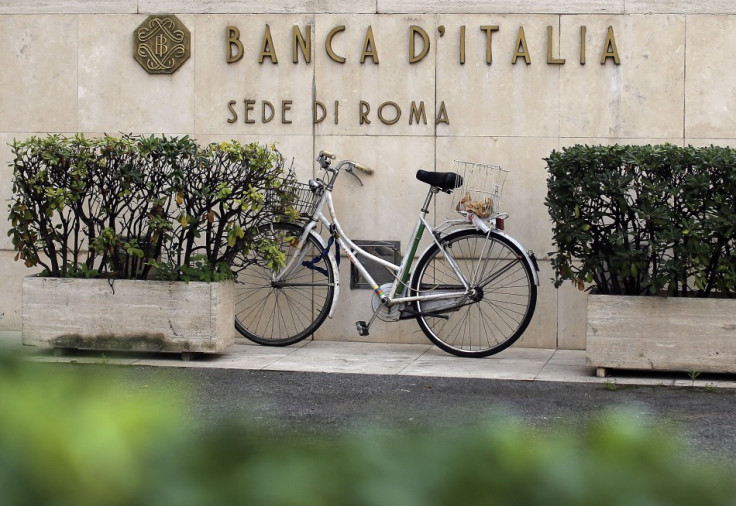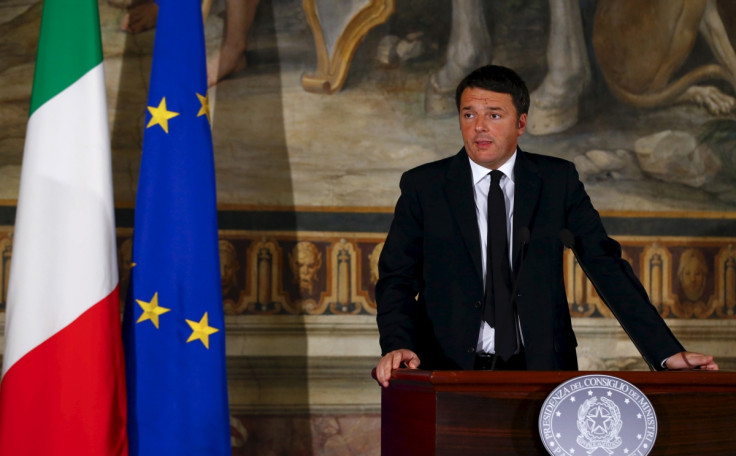Could Italian banks be Eurozone's next big crisis?
Italy's banking sector is burdened by bad loans amounting to 25% of the country's GDP.

Earlier this month, Italy had to come to terms with something it had never experienced before as, for the first time in history, Germany knocked it out of a major tournament.
If the defeat was hard to take – Italy twice led during the penalty shoot-out – it paled in significance when compared to the challenge Italy faces from Berlin on an altogether different playing ground: the banking sector.
Following financial turmoil in Greece last year and Britain's European Union referendum last month, economists have queued up to earmark the problems of the Italian banking sector as the Eurozone's next flash point.
However, Michael Hewson, chief market analyst at CMC Markets UK, told IBTimes UK that a crisis among Italy's lenders could be way worse than Brexit, the importance of which "has been largely overplayed".
Since April, shares in the major Italian banks have tumbled and the sell-off has been exacerbated by Britain's decision to vote in favour of leaving the EU.
"Italian banks have been a systematic problem for a number of years and Brexit is merely the straw that broke the camel's back, as it has crystalised the issue," Hewson explained.
Italy's banks, which have been under pressure for of years, are burdened by some €360bn (£304bn, $400bn) worth of bad loans, the equivalent of a fifth of the country's gross domestic product.
Shares in Monte dei Paschi di Siena, the world's oldest lender, have plummeted by as much as 75% so far in 2016 and the bank has been told by the European Central Bank to reduce its holding of bad debts. Several attempts to clean it up have failed and, with the ECB stress test looming large later this month, the bank's solvency is in serious doubt.
"Monte dei Paschi di Siena has already been bailed out twice and yet some are considering throwing more money at it," Hewson added. "It did not work the first two times, so why does anyone expect a different outcome this time?"
Rome and Brussels have held negotiations to devise a plan that would allow rescuing Italy's struggling bank while complying with EU regulations.

Italy's only alternative, a cash injection from the government, is all but impossible, given the EU bailout rules do not allow states to bail out banks unless their bondholders take losses first.
"The EU and ECB have a no taxpayer bail out policy," John Redwood, chief global strategist at Charles Stanley, explained to IBTimes UK.
"They wish the shareholders and bondholders of the affected banks to pay for past losses. If they are completely wiped out, then large depositors also have to take a hit.
"They want the banks to seek new investment funds from the private sector. This is a possible way to resolve the problems in the banks. Usually they create a good bank to undertake new business, and a bad bank to run off the poor performing loans."
Furthermore, forcing taxpayers to foot the bill for the nation's struggling lenders would, in all likelihood, inflict terminal damage to Italian Prime Minister Matteo Renzi's hopes of winning a referendum on constitutional reform this autumn.
"Renzi knew the bailout rules, so why did he agree to them if he did not think Italy could be compliant?" Hewson added.
"In the Eurozone, there is absolutely no appetite for taxpayers' money being used to bailout banks."
In the Eurozone, there is absolutely no appetite for taxpayers' money being used to bailout banks.
The political repercussions of a state-funded banks bailout would not only be limited to Italy, given German voters, who will go to the polls next year, are unlikely to be impressed should Italy be allowed to bend the rules.
"We wrote the rules for the credit system," the German Chancellor Angela Merkel said in response to Renzi's appeals for leniency. "We cannot change them every two years."
Gloomy as the picture might be, economists expect all parties involved to reach a compromise, if only because the alternative sounds too frightening to be considered, particularly as Italy's economy remains 8% smaller than it was before the financial crisis.
"Should Italian banks collapse, they would take the rest of EU lenders with them, given a number of German banks have also been under pressure and the negative rates imposed by the ECB only exacerbate the profitability issue," said Hewson.
Redwood added Italy's government, the private sector and the ECB were all active in seeking solutions.
"They must be aware of the risks, and especially keen to avoid a major bank getting into trouble which would then create a large knock on losses elsewhere in the Eurozone commercial banking system," he said.
© Copyright IBTimes 2025. All rights reserved.






















